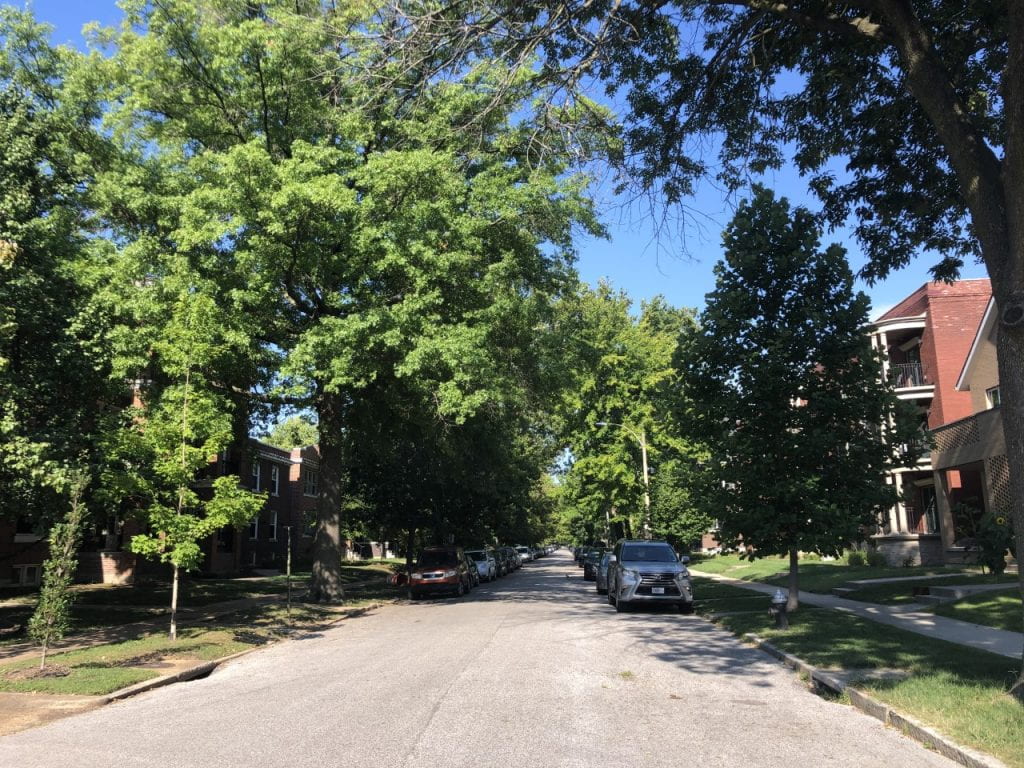FOR IMMEDIATE RELEASE: OCTOBER 20, 2022

Contacts
| Midwest Climate Collab: Heather B. Navarro, Director O: 314.935.9541 C: 314.808.4345 hnavarro@wustl.edu | Dane County, WI: Ariana Vruwink, Director of Communications vruwink.ariana@countyofdane.com Scott Adrian, Exec. Assistant to the County Administrator adrian@countyofdane.com | Kansas City, KS: Melissa Kozakiewicz, Communications Director Melissa.kozakiewicz@kcmo.org |
MIDWEST CLIMATE COLLABORATIVE LANDS FIRST FEDERAL GRANT TO ADDRESS URBAN HEAT ISLAND EFFECT THROUGH COMMUNITY INSPIRED SOLUTIONS TO MAINTAIN TREES
ST. LOUIS – The Midwest Climate Collaborative (MCC) was recently awarded a National Science Foundation (NSF) Civic Innovation Challenge (CIVIC) grant to explore solutions to mitigate heat island effects through a collaborative effort of four Midwestern communities. This grant aims to design community-based solutions by working with stakeholders and applying existing research and data for equitable expansion of the tree canopy. “Higher temperatures escalate public health concerns and disparities, increase energy burdens, and adversely affect local economies,” said Heather Navarro, director of the MCC. “There are many ways communities can mitigate heat stress, including the expansion of an area’s tree canopy.”
For many communities, planting trees is a function of the local government with assistance from nearby non-governmental organizations. The grant will identify new funding to support long-term maintenance of trees as well as a Midwest Tree Canopy Hub to share data and methodologies for mitigating extreme heat with expanded tree canopy. “From improving air quality to sequestering carbon, which help us meet our climate targets, trees are a vital tool to improving our health and well-being while making our neighborhoods more livable and pleasant,” said County Executive Joe Parisi of Dane County, Wisconsin, one of the grant partners.
This opportunity will also help local governments leverage additional funds and resources to amplify their efforts. In Kansas City, Mayor Quinton Lucas announced “Earlier this month, I was proud to stand up a new Tree Fund in Kansas City, seeded with a $25,000 climate award presented by the U.S. Conference of Mayors. Kansas City grows that success by announcing this additional NSF CIVIC grant will help strengthen our city’s tree canopy in all areas, especially areas under-served by current tree coverage, as we continue our work to combat climate change.”
The NSF CIVIC grant flips the community-university dynamic, asking communities to identify civic priorities ripe for innovation and then to partner with researchers to address those priorities. The MCC’s grant responds to concerns heard from local governments and non-profits in the Indianapolis, Kansas City, Madison, and St. Louis regions about the challenges of maintaining trees in order to reap all the benefits they provide. Stakeholders from all four communities will be engaged in planning this fall and will submit a stage 2 proposal early next year for implementation.
Grant Partners by city
| Indianapolis, IN | Kansas City, MO | Madison, WI | St. Louis, MO |
| City of Indianapolis Indiana University Environmental Resilience Institute Keep Indianapolis Beautiful | City of Kansas City Heartland Tree Alliance at Bridging the Gap University of Missouri-Kansas City | Capital Area Regional Planning Commission City of Madison County of Dane University of Wisconsin-Madison | City of St. Louis Energy Care Forest ReLeaf Washington University in St. Louis |
The Civic Innovation Challenge (CIVIC) is a research and action competition that launched in April 2020 with funding from the National Science Foundation. NSF is joined by the U.S. Department of Energy, and the U.S. Department of Homeland Security for this next iteration of CIVIC. Teams of academic and civic partners competed for awards to support the rapid implementation of community-driven, research-based pilot projects that address mobility and resilience priorities. For CIVIC 2022, 56 teams have been granted Stage 1 planning awards of $50,000 over 6 months. NSF, DOE, and DHS will announce the Stage 2 teams in the Spring of 2023. Each Stage 2 awardee will receive up to $1 million to implement their envisioned pilot projects over a 1 year time frame.
The Midwest Climate Collaborative is a multi-sector collaborative working towards a vision of a carbon neutral, climate resilient, interconnected Midwest region. For more information please visit https://midwestclimatecollaborative.wustl.edu/ or contact Heather Navarro.
###